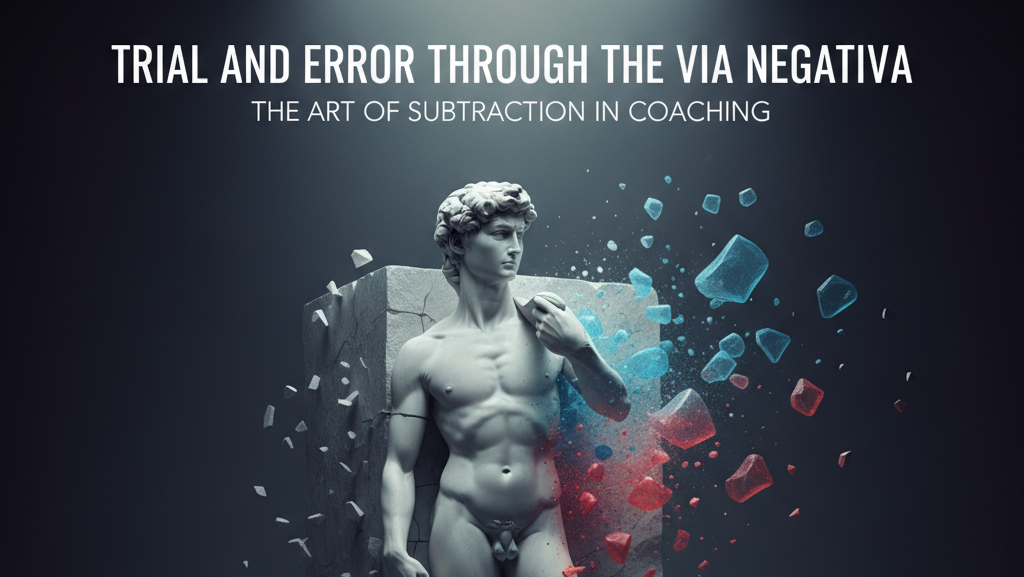“Could you tell me the secret of your talent? How did you create the statue of David – this masterpiece among masterpieces?”
Michelangelo replied:
“It’s very simple. I removed everything that was not David.”
Quote from “Think Smart” by Rolf Dobelli
What do you feel from this exchange between the Pope and Michelangelo regarding the statue of David?
The Via Negativa (Path of Negation)
The lesson from this famous exchange is clear:
“What we should not do is more important than what we should do.”
Let’s apply this concretely to our individual lives. By eliminating everything that is not David (everything we should not do), we can complete a magnificent statue of David (live a wonderful life).
This way of thinking is called the “Via Negativa” (Path of Negation) in Christian theological studies.
“Via Negativa” as the Art of Subtraction
At the foundation of the Via Negativa thinking method lies the belief that discovering “what we should do” (what we should do to live a truly happy life) is extremely difficult.
Starting from this premise, it suggests that we can discover “what we should not do” (what we should avoid to live a truly happy life).
This approach means that eliminating what we should not do – removing “waste” – ultimately leads to concentration on what we should do, bringing us closer to the “essence.”
The Value of “Subtraction (Reduction)”
This is my personal observation, but it seems that subtraction is not widely welcomed in mainstream values (though this is changing). The reason may be that the word “subtraction” conjures images of “reduction,” which conflicts with the prevailing capitalist society value that “addition” or “growth” is important.
When we unconsciously follow societal values, our thinking naturally gravitates toward “adding more.”
However, let me remind you once more of the initial quote:
“What we should not do is more important than what we should do.”
The value of subtraction – eliminating what we should not do – makes life better.
Trial and Error Through the Via Negativa
Now, let’s move toward a conclusion.
I’ve been discussing this on the somewhat grand scale of “life,” but let me apply it to “volleyball coaching environments.”
Coaches act to help individual players approach their respective goals. In this process, they face various new challenges. Through continued challenge, they eventually realize:
There isn’t enough time to do everything.
What should players really “do” to approach their goals?
This is where the Via Negativa demonstrates its power.
Instead of asking “what should we do,” we ask “what should we not do.”
Determining “what we should not do” is relatively easy. Then we continue the process of subtraction.
Engaging in trial and error through the Via Negativa – if we can continue this approach, waste will naturally be eliminated, and we can become somewhat more helpful in bringing players closer to their goals.
Practical Applications in Development
This subtractive approach represents a fundamental shift in coaching methodology from addition-based to essence-focused development.
Key Implementation Strategies:
Priority Elimination: Regularly assess training activities and eliminate those that don’t directly contribute to player development goals.
Focus Identification: Rather than asking “What else can we add?” ask “What can we remove to create more concentrated learning?”
Essential Skills Emphasis: Identify the core competencies that truly matter for each player’s development stage and eliminate peripheral activities.
Time Optimization: Recognize that effective coaching often means doing fewer things with greater depth rather than covering more topics superficially.
This Via Negativa approach in coaching mirrors the artistic process – revealing the masterpiece by removing everything that doesn’t belong, allowing the essential beauty of player development to emerge naturally.
Keywords: via negativa coaching, subtraction methodology, youth volleyball development, essential skills focus, coaching philosophy, minimalist training approach, player development optimization, coaching efficiency


